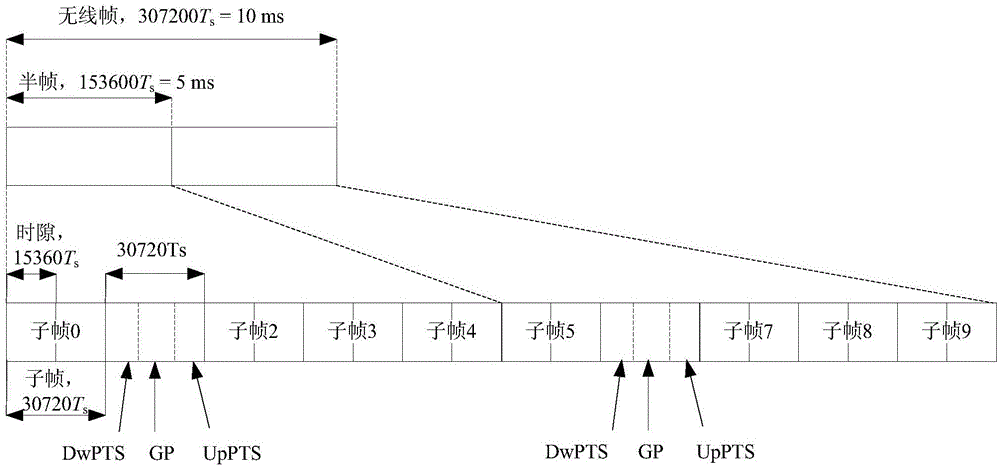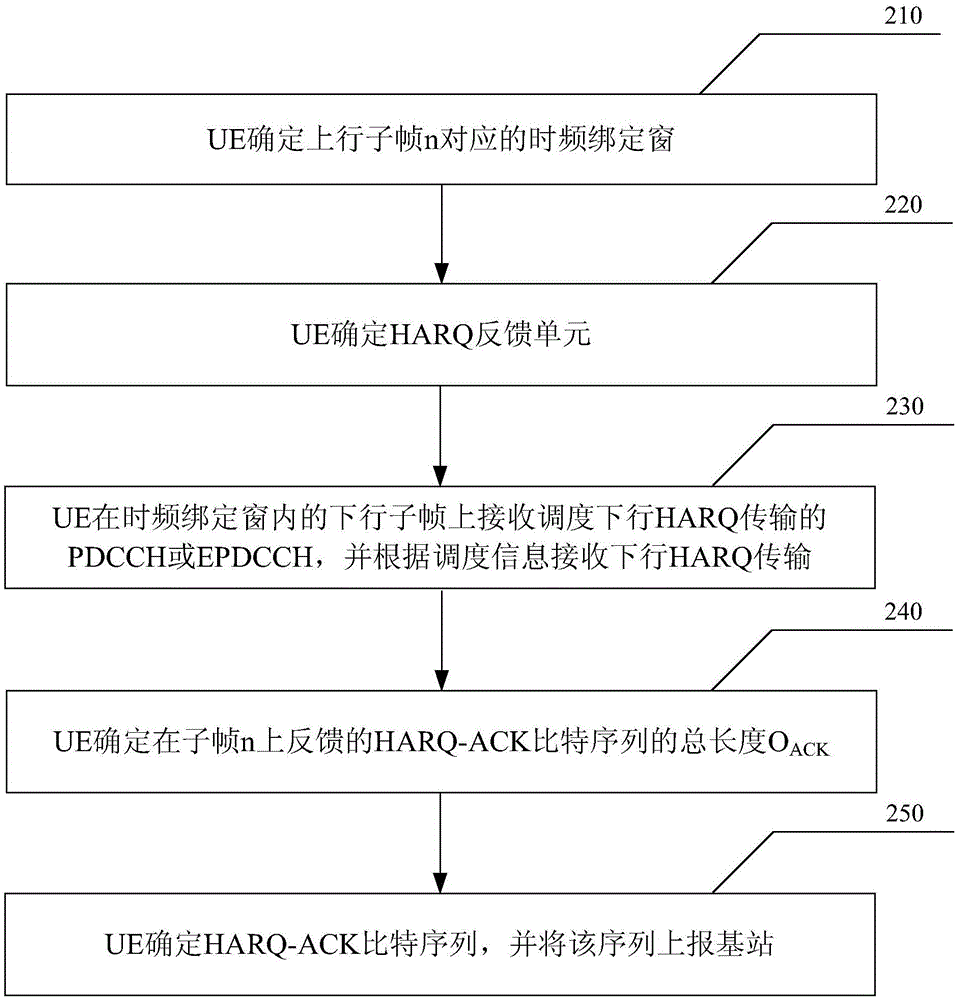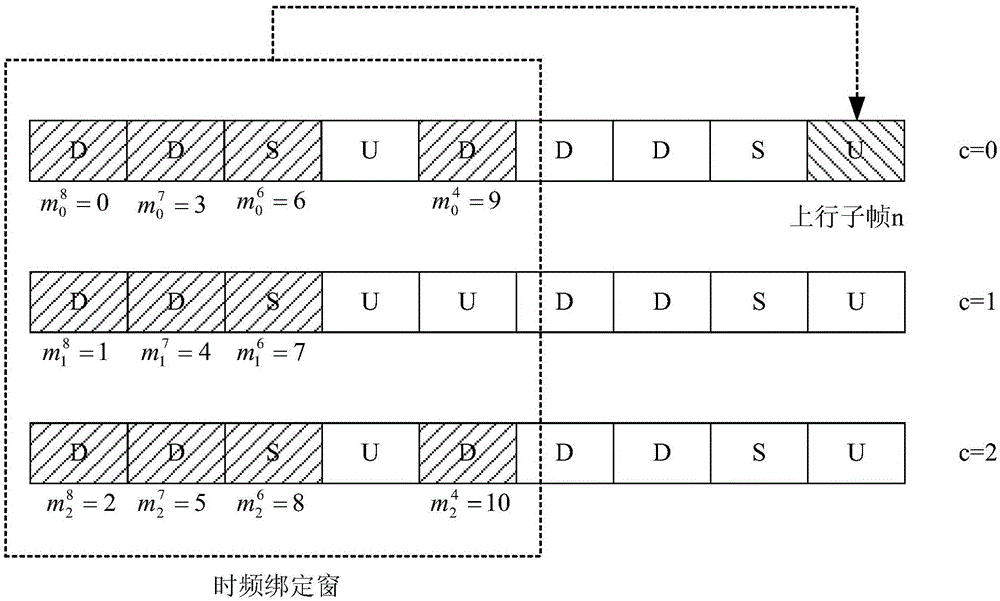HARQ-ACK information feedback method and device
A technology of feedback bits and feedback units, applied in the field of feedback of HARQ-ACK information, can solve the problems of no solution, increasing the upper limit of the number of carriers, and low feedback efficiency.
- Summary
- Abstract
- Description
- Claims
- Application Information
AI Technical Summary
Problems solved by technology
Method used
Image
Examples
Embodiment 1
[0094] In this embodiment, all downlink CCs of the UE are FDD downlink carriers, that is, the UE feeds back the HARQ-ACK of the downlink CC according to the FDD downlink HARQ timing relationship, and according to the eNB signaling instruction, the UE reports the feedback unit in the HARQ-ACK process In addition, the number of bits in the DL DAI field is 3, and the UE determines the total number of feedback units by receiving eNB physical layer signaling before determining the feedback bit sequence. There is no SPS scheduling within the time-frequency binding window. The specific implementation steps are as follows:
[0095] Step 1: The UE determines the time-frequency binding window corresponding to the uplink subframe n.
[0096] In this embodiment, K={4}, the time-frequency binding window is a set of downlink subframes with subframe numbers n-4 on all downlink CCs for which the UE feeds back HARQ-ACK in uplink subframe n, and the time-frequency binding window The index value...
Embodiment 2
[0107] In this embodiment, all downlink CCs of the UE are TDD carriers, and the UE feeds back the HARQ-ACK of the downlink CCs according to the HARQ timing relationship of TDD uplink and downlink configuration 2, and according to the eNB signaling instruction, the UE reports the HARQ-ACK in the HARQ-ACK process The feedback unit is TB. In addition, the number of bits in the DL DAI field is 3. The UE determines the total number of feedback units by receiving eNB physical layer signaling before determining the feedback bit sequence. There is no SPS scheduling within the time-frequency binding window. The specific implementation steps are as follows:
[0108] Step 1: The UE determines the time-frequency binding window corresponding to the uplink subframe n.
[0109] In this embodiment, K={8,7,6,4}, the time-frequency binding window is a set of downlink subframes with subframe numbers n-k on all downlink CCs where the UE feeds back HARQ-ACK in uplink subframe n , where k∈K, the ...
Embodiment 3
[0118] In this embodiment, there are both FDD downlink carriers and TDD carriers in the downlink CC of the UE, and the carrier where the uplink subframe that feeds back the HARQ-ACK is located is the FDD carrier. The UE feeds back the HARQ-ACK of the downlink CC according to the FDD timing relationship, and according to the eNB signaling instruction, the feedback unit in the process of the UE reporting the HARQ-ACK is the downlink subframe. In addition, the number of bits in the DL DAI field is 3, and the UE according to the eNB's RRC layer signaling determines the total number of feedback units O ACK , namely O ACK is a semi-statically configured value, and O ACK Not greater than the number of downlink subframes in the time-frequency binding window. There is no SPS scheduling within the time-frequency binding window. The specific implementation steps are as follows:
[0119] Step 1: The UE determines the time-frequency binding window corresponding to the uplink subframe n...
PUM
 Login to View More
Login to View More Abstract
Description
Claims
Application Information
 Login to View More
Login to View More - R&D
- Intellectual Property
- Life Sciences
- Materials
- Tech Scout
- Unparalleled Data Quality
- Higher Quality Content
- 60% Fewer Hallucinations
Browse by: Latest US Patents, China's latest patents, Technical Efficacy Thesaurus, Application Domain, Technology Topic, Popular Technical Reports.
© 2025 PatSnap. All rights reserved.Legal|Privacy policy|Modern Slavery Act Transparency Statement|Sitemap|About US| Contact US: help@patsnap.com



